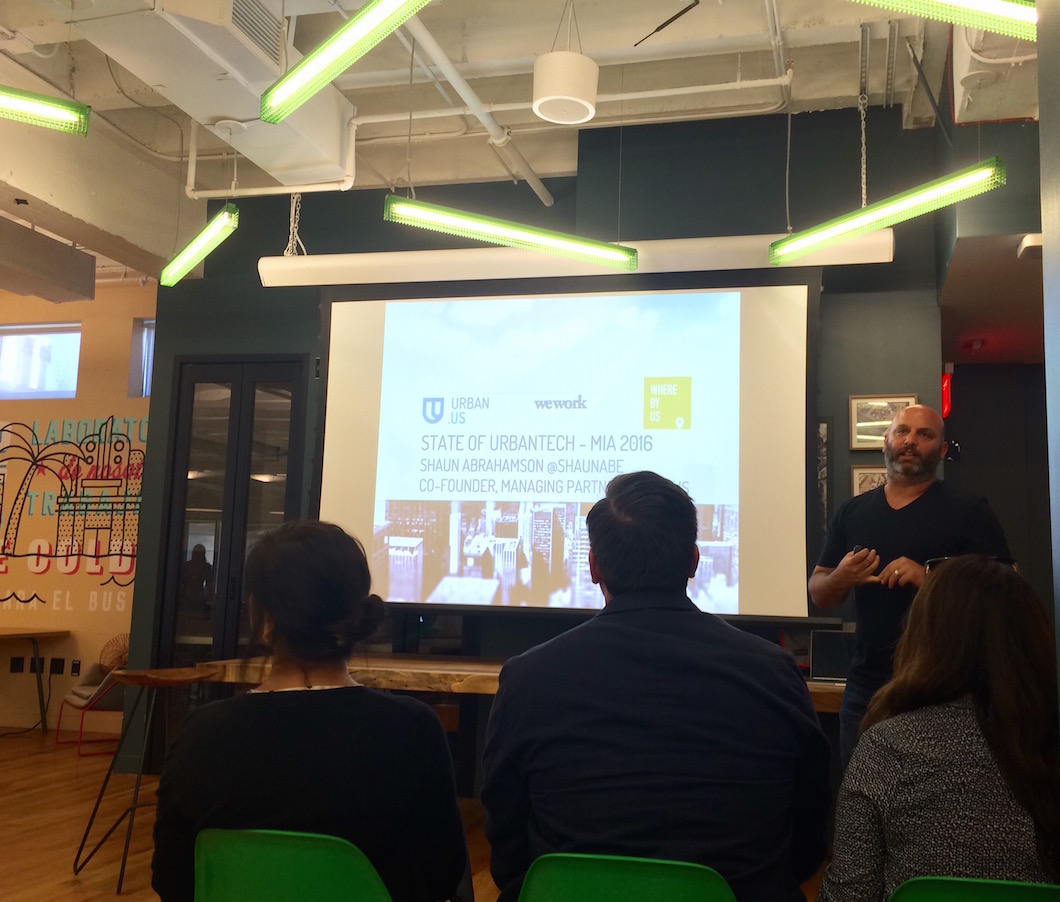
UrbanTech meetup highlights the crucial role of startups in community transformation

Shaun Abrahamson at the State of UrbanTech-MIA 2016. Photo by Emily Dabau.
When Shaun Abrahamson’s son asked to visit his father’s home in Cape Town, South Africa he didn’t think twice about taking him there to share a piece of his past. Inspired by the trip, his son said that he too would one day show his own family his childhood home in Miami. Contemplating the idea against the threat of sea level rise, Abrahamson, who is co-founder of Urban.Us, an investment fund focused on startups that make cities better, was struck by the possibility that his son may not get that chance.
“Trying to think three decades out, it was a very real moment,” Abrahamson said.
Issues such as sea level rise are what inspired Abrahamson to establish Urban.Us, which funds projects that tackle challenges affecting communities including: climate change, transportation, urban density and energy consumption.
Abrahamson recently explained the role of startups in addressing these issues, speaking at The State of UrbanTech – MIA 2016, an event organized by Urban.Us, Whereby.Us and Refresh Miami at WeWork in Miami Beach. The gathering drew an audience of entrepreneurs, investors and startup founders to discuss their role in city transformation.
To create solutions to pressing urban challenges, startups should consider the many ways in which they can make their communities better and develop ideas that can be scaled to other cities, Abrahamson noted.
“We believe that even if it’s not today, at some point throughout the next decade, either the economics or some part of what [startups] do will scale to other cities, so instead of it being a local project it’s something that a lot of cities could benefit from,” Abrahamson said. “I think a lot of it is not about the product, but the way in which they [startups] try to understand their customers and their stakeholders and then how they build solutions.”
Independent entrepreneur and investor Andrew Carton, who attended the event, said a key part of starting the cycle of change begins with informing the community of city problems shared by everyone. Otherwise, “people don’t have an intimate knowledge of what the problems are. They only know the problems they have experienced,” Carton said.
“An entrepreneur could come across one of those problems and think ‘I know how to solve this.’ We need to publicize our problems as much as our solutions,” he said.
Startups can play an integral role in solving the community issues such as the ones Abrahamson highlighted, Carton explained.
Carton said that he invests in people who aren’t discouraged by community problems, but rather work to think of creative solutions.
“It’s important to inform people about these issues to raise awareness that these problems are not intractable and that it’s someone’s responsibility to actually fix them…If you can get that effect going then we’ll have a generation of people who say ‘we’re here to solve problems, not to live in problems,” he said.
To address some of the environmental issues affecting Miami Beach, Dara Schoenwald, executive director of the nonprofit VolunteerCleanup.org, which organizes trash clean ups and raises awareness about marine debris, partnered with Woosh Water Systems, an Israeli startup that aims to create water bottle refill stations throughout cities. Schoenwald is the Miami representative for the project, which will provide purified water to people for a fraction of the cost of bottled water. The water stations will also incorporate a tech element, integrating touch screens and a data collection tool that will help share impact information with the city.
“The key benefits of using the bottle stations primarily is reducing plastic waste.The heavy consumption we have in this country of drinking water out of plastic bottles is because people do it for convenience,” Schoenwald said. “We thought maybe we could make a dent in that if we provided a more convenient alternative that was not only convenient but also cost effective and had a big environmental impact.”
Commenting on the idea, Abrahamson emphasized that startups need to develop this problem-solving mindset in order to transform cities and advance progress.